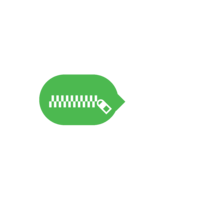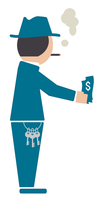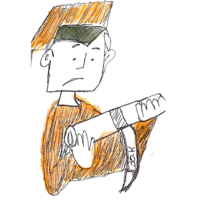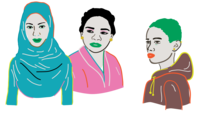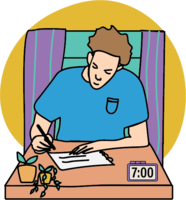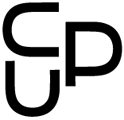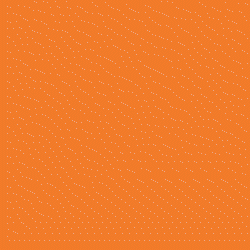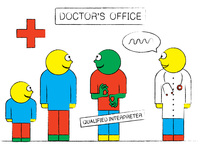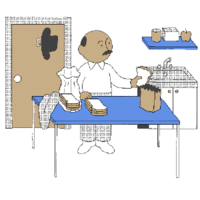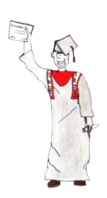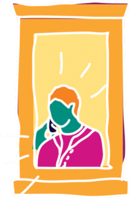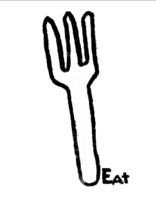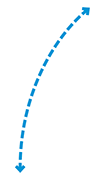1. What are some skills or lessons that you thought you gained from CUP that you have used in your life outside of CUP?
I have learned that teamwork is really important. By working on a project where everybody took on a different role, it helped me understand how to use teamwork and partnership. It also helped me realize that everybody’s ideas matter, and that everybody’s ideas should be incorporated. For example, instead of saying, let me do it, let me do it – I learned to say, okay, my groupmate has an idea. Let’s use their idea. Maybe we can use another groupmate’s idea to try to work together.
2. What do you think has stuck with you most from your time at CUP?
I think something that has stuck with me the most from my time at CUP has been the idea that just because everybody has a different opinion doesn’t mean that you can’t try to see things from their point of view. So, while working on the projects, sometimes not everybody wanted to do the same thing, or not everybody viewed a certain issue the same way. So it was good to communicate with everyone by asking, what do you think about it? How can I use what you think and what I think in a collaborative way, instead of saying, no, you’re wrong, I’m right. We can agree to disagree, but that doesn’t mean I have to be disrespectful towards what you think or what you believe in.
3. Why do you think that it’s important for youth to address challenges within their communities?
As a young person, it’s better to understand what your community is going through and understand the part you play in your community. I know sometimes it’s hard to see things that are not in your control or are not something you feel like you can directly change. But sometimes when you look into your community and you find something small that you feel is just not right, you can think about what you can do in your power to change it. It can help youth to feel more connected, because sometimes there are older people in their community who might not be able to speak out for themselves. When the youth get involved, they have younger voices — sometimes even louder voices. They can do much more with their time and energy than somebody who may be a little bit older, who might not be able to put in that work. So it’s really important to address community challenges as a young person because you could be the voice of somebody who might not have that voice.
4. What do you think are some of the benefits of using art and design to address community challenges?
One benefit to using art and design is that people are able to visualize what we’re communicating. Sometimes words are hard to break down, even if we have it in a million different languages, sometimes people need a visual example in order to understand. For example, a picture, a diagram, or a flyer might make it easier for someone to understand a concept, as opposed to a large chunk of writing with big elaborate words. Sometimes you just need to visualize it, so you can really process in your head. Instead of a sentence saying, “1 out of 10 people,” maybe you need an illustration of 1 out of 10 people shaded in. This is really important because not everybody learns solely through literature. Having that illustration and digital art makes it so much easier for so many different people to actually understand what the whole project is about.
5. Can you tell me about one of your favorite experiences at CUP?
One of my favorite experiences at CUP was when we had a cultural day, where we brought foods that mean something significant to us in our culture and at home. We all sat down together and we ate and tried each other’s cultural foods. It gave me the opportunity to taste and see and listen to everybody’s personal life story when they shared about whatever dish or snack they brought. It was really important and meaningful to me to understand the people I was working with because not only did I get to learn about them as a person, but I also got to learn a little bit about where they came from and how proud they were to be whoever they were because they were able to express and share it with me.
CUP was an awesome experience, and I ended up learning so much more than I expected in my first year there. When I first started, I thought I was there to do a program to put on my college transcript and that’s it. But the next year I was like, you know what? I can do this again, because it made me feel like I was part of a community, especially because all three years I had the same teacher. Even though I had a little attitude sometimes, I felt like in the end, what I learned and what I took from it would beat my attitude any day.
6. Do you hope to continue doing community work in the future, and if so, what issues are you most interested in addressing?
I do plan on continuing community work in the future because before I was doing CUP in high school, I was in social justice group at my middle school. So when I started CUP, I was familiar with social justice and thought the program could be an opportunity to get more involved in the community. I feel like if I find similar programs in the future, whether my role be as a participant or leader, it would definitely be of interest to me. As a member of my community and a part of the world as a whole, I think it is my duty to help and make sure everybody understands what’s going on in terms of social injustice. Social injustices affect everyone differently, but it’s all something we have to deal with. Whether injustice is encountered in everyday life or not, you always have to come in contact with something that relates to a social justice issue in some form. The more we run into these issues, the more prevalent they are and the more we have to address it as a community.
